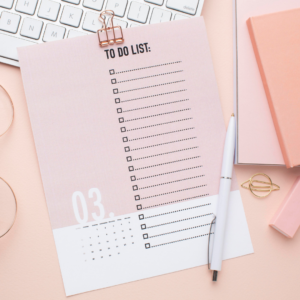Do you feel like you never have enough time in the day? Are you constantly rushing from one task to the next, and feeling stressed out and overwhelmed? If so, you’re not alone.
In today’s busy world, it can be hard to find enough time to do everything we want or need to do. But luckily, there are ways to save time and get more done each day. In this blog post, we will discuss 10 time management tips that will help you save an hour a day!
1. Set priorities
The first step to effective time management is setting priorities. You can’t do everything, so it’s important to figure out what your most important tasks are and focus on those.
To set priorities, make a list of all the things you need to do in a day or week. Then, rank them in order of importance. Start with the most important tasks and work your way down the list.
If you’re not sure what your priorities are, ask yourself these questions:
– What are my goals?
– What is due soon?
– What will have the biggest impact?
– What do I need to do to meet my deadlines?
Once you have your priorities set, it will be easier to focus on the tasks that are most important and save time on the less important ones.
2. Make a schedule
Another way to save time is by making a schedule. Having a set schedule will help you stay on track and make sure you’re using your time wisely.
To make a schedule, start by figuring out how much time you have in a day or week. Then, block out time for each of your tasks. Make sure to include time for breaks, and don’t forget to schedule some free time too!
If you’re not sure how to make a schedule, there are plenty of templates and tools available online. Once you have your schedule made, be sure to stick to it as much as possible.
3. Use a timer
If you find it hard to stay on task, try using a timer. Setting a timer for yourself will help you focus and make sure you’re using your time efficiently.
To use a timer, start by figuring out how much time you have for each task. Then, set the timer for that amount of time and start working. Once the timer goes off, take a break and then start again.
If you find that you’re constantly going over the time limit, try setting a shorter timer. And if you find yourself with extra time, use it to work on another task or take a longer break.
4. Take breaks
It might seem counterintuitive, but taking breaks can actually save you time. If you’re constantly working without a break, you’ll start to feel overwhelmed and burned out.
Taking regular breaks will help you stay focused and refreshed so that you can work more efficiently.
If possible, take a break every hour or so. Step away from your work, stretch, or take a walk. And be sure to take a longer break every few hours.
If you can’t step away from your work, try taking mini-breaks. For example, set a timer for five minutes and then take a quick break. Get up and walk around, grab a snack, or just take a few deep breaths.
Don’t forget to schedule some free time into your day as well! This will give you time to relax and recharge so that you can be productive later on.
5. Eliminate distractions
One of the biggest time wasters is distractions. When you’re trying to focus on a task, it can be hard to stay on track if you’re constantly being interrupted.
To eliminate distractions, start by turning off your phone and any other devices that might make noise or distract you. Then, find a quiet place to work where you won’t be interrupted.
If you’re working from home, let your family and roommates know that you’re busy and need some uninterrupted time. And if you’re working in an office, try to find a quiet space or wear headphones to signal that you don’t want to be disturbed.
Eliminating distractions will help you focus on your work and get it done more quickly.
6. Set deadlines for yourself
Setting deadlines can be a great way to save time. Having a deadline will help you focus and make sure you’re using your time wisely.
To set a deadline, start by figuring out when you need to have the task done. Then, work backward and set a deadline for yourself. Make sure the deadline is realistic and give yourself some wiggle room in case you need it.
Once you have a deadline, make sure to stick to it as much as possible. This will help you stay on track and get the task done in a timely manner.
If you find that you’re constantly going over your deadlines, try setting shorter deadlines. And if you find yourself with extra time, use it to work on another task or take a break.
7. Delegate tasks and ask for help
One of the best ways to save time is to delegate or ask for help. If you’re trying to do everything yourself, you’ll start to feel overwhelmed and bogged down.
Instead, try to delegate some of your tasks. For example, if you’re a manager, delegate some of your work to your team. Or if you’re a student, ask your professor for help.
Asking for help can be tough, but it’s often worth it. Delegating or asking for help will save you time in the long run and help you get the task done more efficiently.
8. Automate and batch tasks
Another great way to save time is to automate or batch your tasks. Automating your tasks will save you time in the long run by doing the work for you.
For example, if you’re a web developer, you can use automation tools to minify your code or compress your images. Or if you’re a writer, you can use a tool like Word to save your document as a PDF.
Batching your tasks is another great way to save time. Batching is when you group similar tasks together and do them all at once.
For example, if you’re a blogger, you can batch your posts by writing several at once and then scheduling them to be published throughout the week. Or if you’re a graphic designer, you can batch your projects by working on several at the same time. You can maybe use a whiteboard to keep everything in order.
Automating and batching your tasks will save you time in the long run and help you get more done.
9. Only focus on one task at a time
One of the biggest mistakes you can make is trying to focus on too many things at once. When you’re trying to do two things at once, you’ll actually end up taking longer and getting less done.
Instead, try to focus on one task at a time. This will help you stay focused and save time in the long run.
If you find yourself getting distracted, take a break or move on to another task. And if you’re feeling overwhelmed, try breaking the task into smaller pieces.
Focusing on one task at a time will help you save time and get more done.
10. Don’t overcommit yourself throughout the day
Overcommitting yourself is one of the biggest time wasters. When you say yes to everything, you’ll end up with a lot on your plate and not enough time to do it all.
Instead, try to be more selective with your commitments. If you’re asked to do something, ask yourself if it’s really necessary. And if it is, ask yourself if you have the time to do it.
If you find that you’re always overcommitted, try setting some boundaries. For example, you can say no to requests that are not related to your work or priorities. Or you can set a limit on how many commitments you’ll make in a day.
Final Note
Time management is a skill that you can learn and improve with practice, and saving an hour a day is a great place to start.
By using some of the tips and tricks above, you can save time in your day-to-day life and get more done. So what are you waiting for? Start saving time today!




